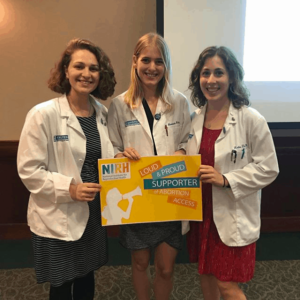Under a siege of anti-choice rhetoric at the national level, New York has felt like a ‘safe place.’ Abortion was legalized here in 1970 before Roe V. Wade, a provider assured me during my medical school interview. Hearing this, and knowing of New York’s historically blue political leanings, led me to idealize the state of abortion access in New York. I would soon be surprised at how much resistance there is here towards simply keeping abortion legal.
Medical school was an opportunity to connect medicine to public health and policy, and to learn how to marry my professional career with my activism. Throughout college, I supported the fights for health access, labor rights, and climate change. I helped organize rallies for divesting our university endowment from fossil fuels and for passing single-payer insurance at the Massachusetts statehouse. I joined the Massachusetts organizing team for the 2017 Women’s March in DC, which brought thousands of Massachusetts residents to the capital. I see these social issues as key to ensuring a healthy environment and access to healthcare for all.
But in my first year of medical school, I did not find any opportunities to learn about how providers do political advocacy. An email from Physicians for Reproductive Health (PRH) alerted me to the Reproductive Health Act (RHA), an update to New York State’s abortion law of 1970. As I read more on the RHA, I began to realize that New York’s laws were not as progressive as I thought. For example, the penal code still includes performing an abortion as a crime. Of course, this is not enforced because Roe V. Wade is a federal decision. But with Roe facing threats, passing the RHA and protecting abortion access in New York is imperative.
PRH organized a lobby day for providers to testify to their state reps on the Reproductive Health Act. I was frightened by the prospect of Roe being overturned, but emboldened by my desire to see physician-led advocacy first hand. Our MSFC chapter went to work. In preparation, we hosted a letter-writing session where we testified in writing to our state senator and the chairman of the health committee. Three of us then drove to Albany to speak to our representatives in person alongside the rest of the PRH cohort. On the ride up, I felt the weight of the hand-written letters in my bag and the light-headedness of excitement. When we spoke with our representatives, I was nervous and felt my face flushing, yet the more I spoke, the more confident I became. I heard confidence in the voices of my classmates, too, and I felt proud to be testifying alongside such passionate and determined future-physicians.
However, the RHA and the Comprehensive Contraception Coverage Act (a bill that would protect access to contraception) did not even make it past committee. In fact, the Reproductive Health Act has been introduced in committee every session for years but has never passed. We urged our state senator, a co-sponsor of the RHA and CCCA, to be a stronger advocate for these bills, even while knowing that he has a record of voting along with his Republican colleagues. We knew it was an up-hill battle as current state senators in New York have never had to vote on an abortion bill before. While they may have campaigned in support of women’s rights, voting on the record has proven too politically risky.
If Roe gets overturned, a woman in New York could go to jail for attempting a self-induced abortion. An abortion provider could be charged with a felony. We cannot stand by as medical students and assume our opinions don’t matter because we’re young, because we’re not yet ‘experts’, or because we’re in a ‘blue state.’ Testifying makes a difference. It shows our representatives that the stakes of these bills are real, and that it is not just their political reputation on the line, it’s human lives.
Editor’s note: if you live in New York, you can find your state senator’s position on the Reproductive Health Act at www.choicechamps.com. MSFC does not endorse or oppose candidates.
